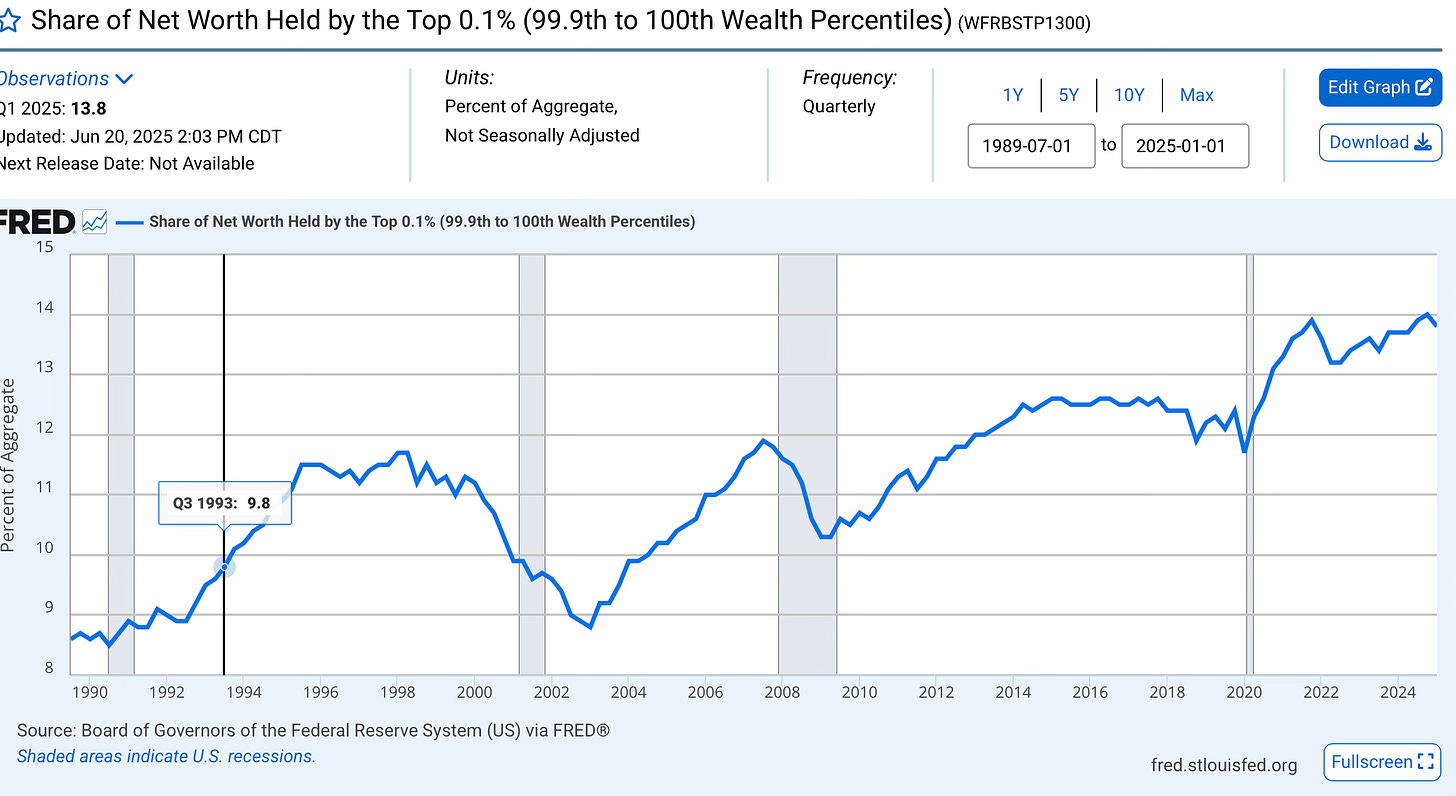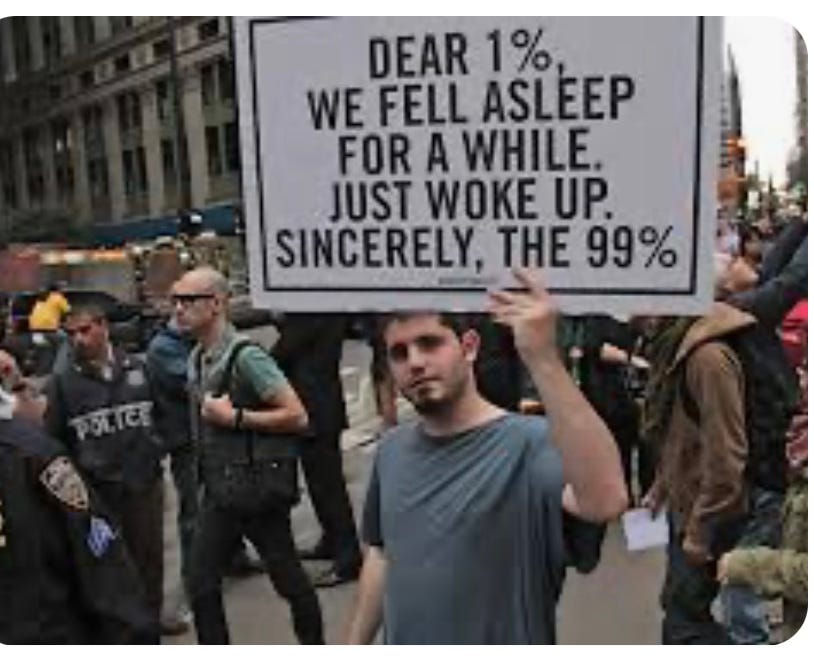Our Second Gilded Age Goes Supernova
And it is a mistake to forget about Occupy Wall Street
Our golden age of capital
I wrote a post eighteen months ago that asserted it was folly for the ultra-wealthy to ignore the dangers of our widening inequality. Since then, wealth inequality hasn’t changed very much by the numbers, but it “feels” to me as if our second gilded age has gone supernova.
Maybe my perception is due to the election of Donald Trump with the apparent enthusiastic support of centi-billionaires, or the passing of the “big beautiful bill” that extended tax cuts for the wealthy and reduced spending for the poor, or how the Jeff Bezos-Lauren Sanchez photo-op wedding was so hatefully lavish and cheesy at the same time.
Or an article this week in the New York Times about how a visit to DisneyWorld is now only affordable to the affluent, and that among the affluent, there’s a blatantly visible divide between the DisneyWorld experiences of the mildly well-off vs. the ultra-wealthy. Because now there’s an elaborate hierarchy of money paid vs. time spent waiting in line for the rides.
This excellent article tracks the experience of a middle class family who has been saving up for a once in a lifetime trip to DisneyWorld. 1
“Missing Rise of the Resistance, a crown jewel, is particularly frustrating. Ms. Cressel considered trying to reserve the popular ride in advance but decided against it because of the price tag ($110 for five people when she checked the prices).”
On inequality feeling more and more pervasive, I sense complacency among the ultra-wealthy. That many of the wealthy feel that all is well if their portfolios of stocks and other financial assets are rising. That any talk of a reversion to former times of reduced inequality is just sound and fury by people who don't get that this golden age of capital is here to last.
Remembering Occupy Wall Street
In 2011, there was populist outrage that the people who had helped to cause the Great Financial Crisis had been neither prosecuted nor properly punished. In the meantime, while Wall Street had been saved, millions of Americans had lost their homes and jobs. The country was deep in a recession. Median real household income fell from $71,000 in 2007 to $66,000 in 2011. 2
The injustice of it was overwhelming to enough people that Occupy Wall Street was born. There were mass protests in cities all over the developed world, but the beginning and the epicenter of OWS was in the financial district of Manhattan in Zuccotti Park where there was an encampment of thousands of protesters.
There was a great deal of media coverage while Zuccotti Park continued to be occupied. But that encampment only lasted two months, from mid-September until mid-November when Mayor Bloomberg dismantled the encampment and OWS on Wall Street was no more.
From the point of view of Wall Street people, most of whom actually worked in midtown as I did, Occupy Wall Street seemed like a piece of downtown, avant-garde theater, critically panned, and thus deserving of its short run.
As for me, OWS was a non-event when it was happening, and any impression it made didn’t register enough for me to mention it in my April 2024 post even though in that piece I focused on events between 2010 and 2012.
The link to that post is at the end of this essay.
The subtle signals of OWS
The lasting effect of OWS is debatable. Some might say it was the widespread currency and permanent place in the lexicon for the tagline “We Are The 99%.” Others might say OWS generally raised consciousness about wealth inequality even if nothing was done to combat it and it continued to get worse.
But what if the effect of OWS was something more subtle, more of an absence than a presence? The implicit takeaway of the wealthy may have been that the “99%” were completely ineffective at accomplishing anything. OWS was famous for its lack of any specific demands as well as for its lack of any organization. If that was the best the 99% could do in conditions ripe for real reform, then maybe the wealthy had nothing to fear.
Another implicit takeaway by the wealthy may have been the Ayn Rand/Atlas Shrugged idea that it is the 1% that makes the world work. Without the 1%, nothing could or would get done.
There hasn’t been a repeat of anything that resembles OWS. Big protests have largely been along political lines, not wealth and income lines. No encore after fifteen years might lead the wealthy to think that inequality was something that people talked about, agreed had gone too far…and that was it.
Self-interest properly understood
I fear that our current gilded age will end not by reform but by something more violent and vicious.3 I no longer see the quick unravelling of Occupy Wall Street as a permanent reprieve for the wealthy but rather as evidence of a potent and enraged force that has not gone away. If anything, the rage and the potency has increased. My self-interest leads me to favor policies that reform inequality before it’s too late. Maybe it’s already too late.
Reform or revolution, Teddy Roosevelt or Maximilien Robespierre, I know which one I prefer.
Question for the comments: reform or revolution, which do you prefer?
My April 2024 post:
Here is the article.
I am part of the problem having, later in life, employed Disney VIP guides, the most expensive and quickest way to experience the parks. When our family would walk past the people waiting in long lines, led by our VIP guide in a distinctive vest, I’d call it the “walk of shame.”
In earlier, more innocent, times, before the introduction of all the elaborate pay-for-line-cutting options, we’d just get to the park early and move as fast as we could in order to go on as many rides as possible before the parks got too crowded. In my memory that was more fun because we used speed and planning to game the system rather than money.
For the record, our go-to ride upon entering the Magic Kingdom was always Pirates of the Caribbean.
Readers may look at the current policies of the Trump administration and think that we are already experiencing something violent and vicious. However, I’m addressing wealth inequality specifically, and I think it’s impossible to look at those policies as an attempt to attack wealth inequality through either reform or revolution.






You say "Mayor Bloomberg dismantled the encampment" as though he sent in a bunch of guys in hard hats to take down physical infrastructure, when what he really did was send in cops to make mass arrests.
I think the real result of the Occupy movement is the way the public discourse has been manipulated to focus on seemingly every axis of inequality other than monetary. The Democrats are all about battling sexism, racism, and discrimination against sexual minorities to the point where it's almost like they don't know about working class people falling into poverty. The Republicans are divided: the position of the old school GOP is that if you're struggling financially, it's your own fault, while the MAGA populists blame immigrants.
This is obviously only going to work as a stopgap measure. In the long run, as impoverishment spreads, people will figure out where the blame belongs. But I don't think these guys are thinking that far ahead. Saul Alinsky once said "I could talk a businessman on Friday into backing a revolution on Saturday that would get him double his money back on Sunday even though he would be certain to be executed on Monday."
That wedding really did feel like some kind of middle finger. Great post!